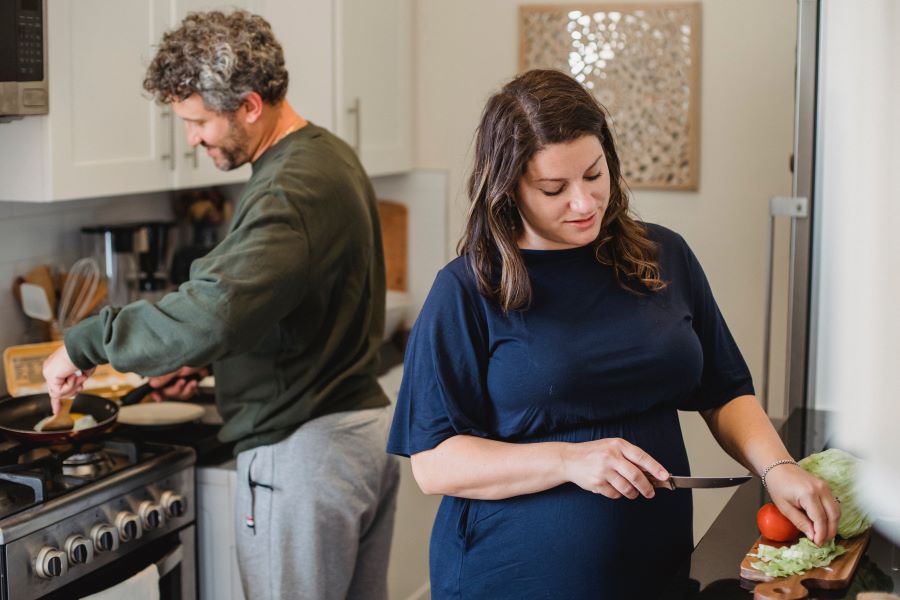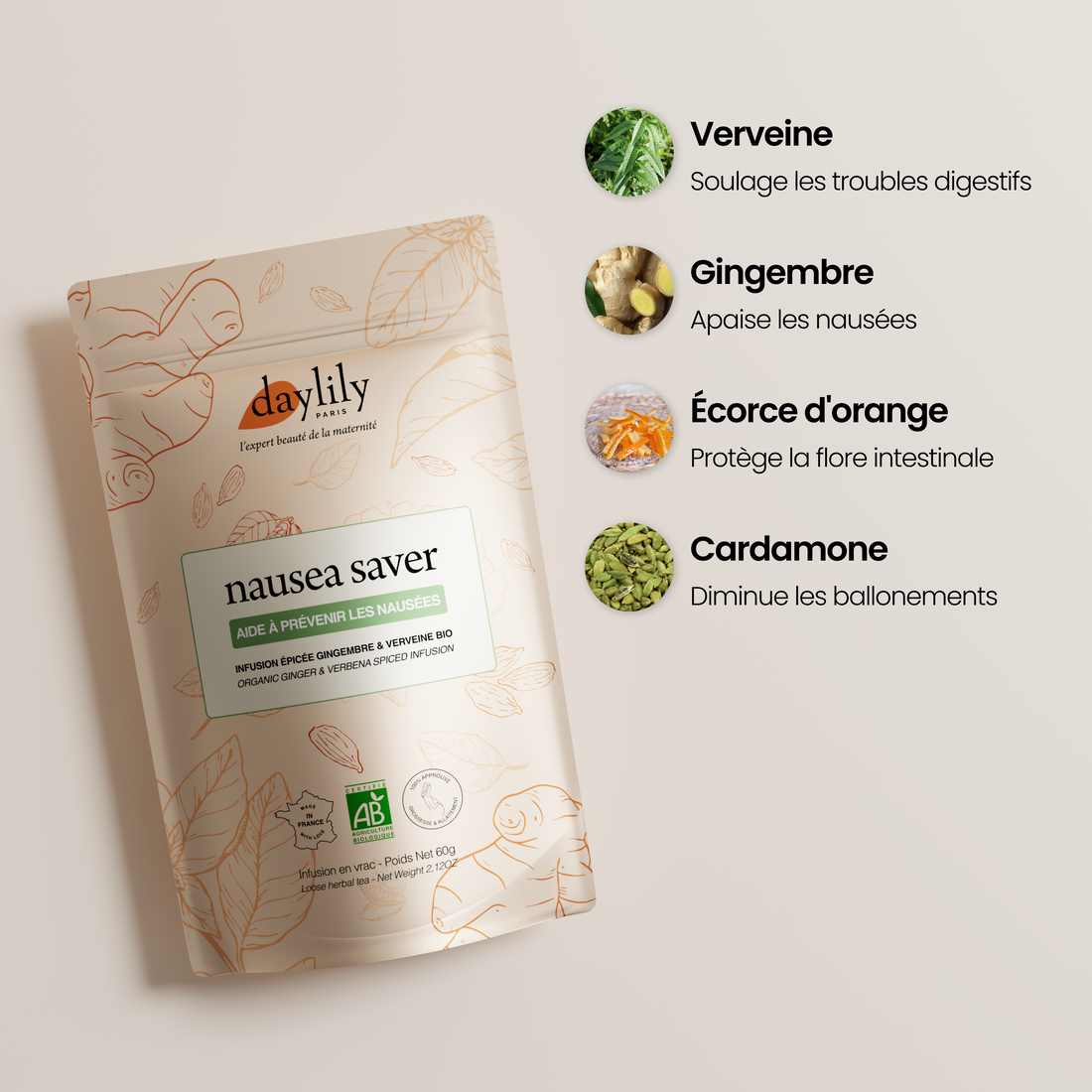- Drinks prohibited during pregnancy
- Foods prohibited during pregnancy, what are the risks?
- What foods are prohibited for a pregnant woman?
- What about cheeses?
Drinks prohibited during pregnancy
Let's start with drinks: obviously, alcohol is at the top of the list of drinks prohibited during pregnancy.
On this side, 0 tolerance : it is not recommended to drink even the slightest drop of wine, beer or other alcohol. Alcohol indeed crosses the placental barrier and can cause – among other things – cranial dysmorphia, developmental delays, and learning difficulties in children. During pregnancy, if this prohibition seems difficult for you to respect, you can turn to non-alcoholic drinks (such as non-alcoholic beer, non-alcoholic champagne) which will allow you to wait until the birth of the baby while keeping a side festive during aperitifs or meals with friends!
Coffee and tea are not prohibited for a pregnant woman, but should be consumed in moderation . No question of drinking coffee after coffee to combat fatigue, or drinking liters of tea in front of your computer.
Two reasons for this: these two drinks contain caffeine, which, if ingested in too high a dose, can impact the healthy growth of the fetus in utero. They can also cause inconvenience for the mother-to-be, for example disrupting her sleep, promoting water retention, and preventing the iron from setting correctly. Remember to take your cup of tea away from meals (at least an hour later) to avoid anemia and stay in great shape!
Daylily Paris is a brand of clean, sensorial and effective skincare products, made in France and 100% compatible with pregnancy and breastfeeding. We're also committed to sharing quality information for an enlightened and relaxed maternity. 🧡
Foods prohibited during pregnancy, what are the risks?
Let's move on to the forbidden foods, and there sorry ladies, but the list is quite long...
During pregnancy, the precautionary principle applies to keep away any risk of contamination and avoid salmonellosis, listeriosis, toxoplasmosis, and other bacteria which could be dangerous for this little fetus.
Please note that some prohibitions concern all pregnant women, and others only some future mothers. This will depend in particular on whether you are immunized (or not) against toxoplasmosis. The verdict will be given at the very beginning of pregnancy by a simple blood test: if you are not immunized, your gynecologist will tell you what precautions to take in your everyday life.
Not cleaning the cat's litter box (or wearing gloves if you have no choice), washing your hands well if you garden, and rinsing your vegetables in water with white vinegar will be among the new actions to adopt at daily.
Toxoplasmosis causes a flu-like symptom in pregnant women, which is certainly not pleasant, but poses no particular danger for the mother-to-be. The infection is, however, very dangerous for the baby, and can lead to eye, heart, neurological malformations, and in the worst case, death in utero.
What foods are prohibited for a pregnant woman?
A certain number of foods or dishes are prohibited during pregnancy, in particular raw or undercooked foods which can be vectors of disease since the bacteria have not been destroyed by cooking.
- Raw meats such as carpaccio or beef tartare should be avoided during pregnancy because they present a risk of listeriosis. The only way to benefit from it is to use frozen products that have undergone a professional freezing process (between -30° and -50°) because this kills the parasite but be careful in this case to respect the cold chain. Otherwise, remember to cook your meat well before consuming it: no blue, rare or even medium steak during these nine months.
- Same principle for rillettes, pâtés, foie gras, raw cold meats (cured ham, sausage, chorizo, etc.). On the other hand, you can easily opt for cooked ham, mortadella, turkey…
- The same goes for raw fish : no salmon tartare, or sushi, to the great dismay of future mothers! Unfortunately, smoking fish is not enough to eradicate possible illnesses: you will find smoked salmon, trout and herring leaving the maternity ward ;-) (Or again, unless you go through products professional frozen foods.)
- When pregnant, it is recommended to eat cooked fish once or twice a week – be careful, however, to choose the species carefully! It is advisable to limit the consumption of large fish . Located at the end of the food chain, these are those which contain the most heavy metals , such as mercury, responsible for neurological disorders in babies. Among the “forbidden fish”, we can cite swordfish, shark, tuna and even rays.
- No question of depriving yourself of eggs : they contain many nutrients of interest to a pregnant woman, including proteins, iron, vitamins and folic acid necessary for the baby's proper development. Just remember to eat them well cooked to eradicate the risk of listeriosis or salmonellosis. Homemade chocolate mousse, homemade mayonnaise and boiled eggs should therefore be avoided for a while.
- Finally, some precautions should be taken with soy , which is concentrated in phytoestrogens, that is to say hormones of plant origin. These can interfere with your own hormones, and create endocrine problems in your baby. You can consume soy and all its derivatives (tofu, soy milk, soy yogurts, etc.) once or twice a week, no more ! The same precautions should be taken during breastfeeding.
What about cheeses?
Bad news also if you are addicted to cheese, since a certain number should be avoided .
These are raw milk and soft or blue-veined cheeses , which are more prone to bacterial contamination than other types of cheese.
It is generally the cheeses with the strongest taste, such as raw milk Camembert, Brie, Mont d'Or, Roquefort, bleu, which are among the cheeses presenting a risk of listeriosis in pregnant women. This list, unfortunately, is not exhaustive.
Favor hard cheeses and those made from pasteurized milk – this notice appears on the product packaging to help you see things more clearly. Pasteurization is a process that eliminates many bacteria in milk, so consuming pasteurized cheese is safe for a pregnant woman! Among the authorized cheeses, let's mention cheddar, Emmental, Gruyere, Parmesan, mozzarella, pasteurized Camembert... I promise, you will be able to find a nice plate of runny and fragrant cheeses after giving birth :-)
As you will have understood, during pregnancy, many foods are singled out and the contents of your plate are often scrutinized.
These small deprivations are necessary to experience a stress-free pregnancy and limit any risk of contamination for mother and baby.
If they are a source of frustration, keep in mind that pregnancy only lasts a short time, and ask the future father to prepare you a king's feast after the birth, because, the good news, all the prohibitions are lifted after childbirth !
Platters of well-made sushi and cheese are yours as soon as you get home, in the company of your little wonder – and we bet that these few months of deprivation will make you appreciate them even more!

















